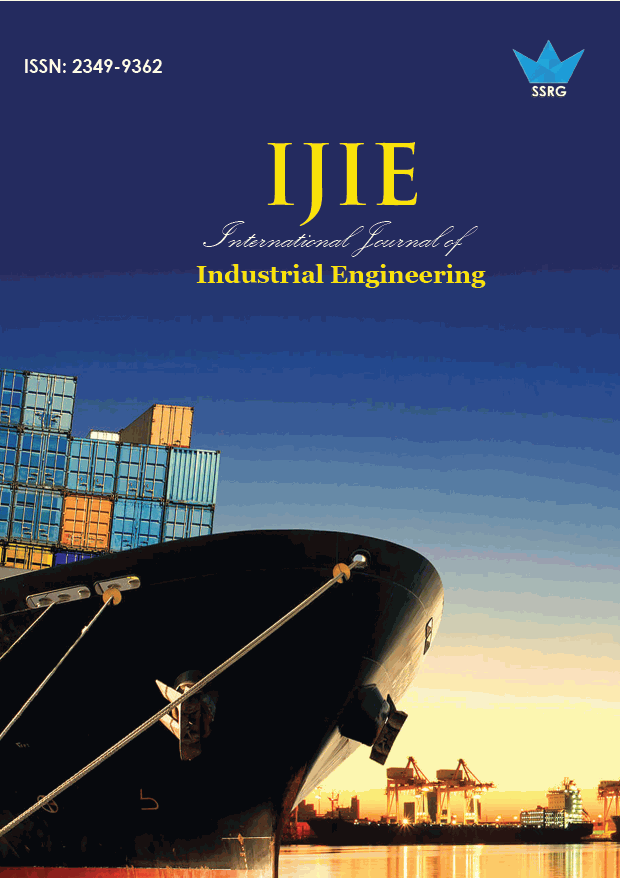Simplification of a Petri Net Controller in Industrial Systems

| International Journal of Industrial Engineering |
| © 2015 by SSRG - IJIE Journal |
| Volume 2 Issue 1 |
| Year of Publication : 2015 |
| Authors : R.Sunther |
How to Cite?
R.Sunther, "Simplification of a Petri Net Controller in Industrial Systems," SSRG International Journal of Industrial Engineering, vol. 2, no. 1, pp. 4-7, 2015. Crossref, https://doi.org/10.14445/23499362/IJIE-V2I2P102
Abstract:
This paper deals with the problem of prohibited states in discrete event systems modeled by Petri Net. To circumvent the forbidden states, some constraints which are called Generalized Mutual Exclusion Constraints can be assigned to them. Enforcing these constraints on the system can be performed using control places. Though when an amount of these constraints is large, a large number of control places must be associated to the system which complicates the model of controller. In this paper, the objective is to propose a general method for dropping the number of the mentioned constraints and therefore the number of control places. This method is based on combining some constraints for obtaining a constraint verifying all of them which is performed using the optimization algorithms. The obtained controller after reducing the number of the control places is maximally tolerant.
Keywords:
Supervisory Control Theory, Petri Net (PN), Generalized Mutual Exclusion constraint (GMEC), Flexible Manufacturing System (FMS).
References:
[1] Abdallah, I.B., ElMaraghy, H.A., "Deadlock Prevention and Avoidance in FMS: a Petri Net Based Approach", Int. J. Adv. Manuf. Tech, 14, 1998, pp. 704-715.
[2] Cassandras,G.G., Lafortune, S., Introduction to discrete event systems, Springer, 2008.
[3] Dideban, A., Alla, H., "Reduction of Constraints for Controller Synthesis based on Safe Petri Nets", Automatica, 44, 2008, pp. 1697-1706.
[4] Dideban, A., Zareiee, M., Alla, H., "Controller Synthesis with Very Simplified Linear Constraints in PN Model", The 2nd IFAC workshop on Depebdable Control of Discrete Systems, Bari, Italy, June 10-12, 2009.
[5] Giua, A., DiCesare, F.M., Silva, M., "Generalized Mutual Exclusion Constraints on Nets with Uncontrollable Transitions", In Proc. IEEE int. conf. on systems, man, and cybernetics, 1992, pp. 974–799.
[6] Huang, Y.S., Jeng, M.D., Xie, X., Chung, D.H., "Siphon-Based Deadlock Prevention Policy for Flexible Manufacturing Systems", IEEE Trans Syst Man Cybern Part-A, 2006.
[7] Krogh, B.H., Holloway, L.E., "Synthesis of Feedback Control Logic for Discrete Manufacturing Systems", Automatica, 27, 1991, pp.641-651.
[8] Park, J., Reveliotis, S. A., "Algebraic Synthesis of Efficient Deadlock Avoidance Policies for Sequential Resource Allocation Systems", IEEE. Trans. Robot. Automat, 16, 2000, pp. 190–195.
[9] Piroddi, L., Cossalter, M., Ferrarini, L., "A Resource Decoupling Approach for Deadlock Prevention in FMS", Int. J. Adv. Manuf. Tech, 40, 2009, pp. 157-170.
[10] Ramadge, P.J., Wonham, W.M., "Modular Feedback Logic for Discrete Event Systems", SIAM Journal of Control and Optimization, 25(5), 1987, pp. 1202–1218.
[11] Yamalidou, K., Moody, J., Lemmon, M., Antsaklis, P., "Feedback Control of Petri Nets Based on Place Invariants", Automatica, 32(1), 1996, pp. 15–28.
[12] Zareiee, M., Dideban, A., Nazemzadeh, P., "From Forbidden States to Linear Constraints", World Academy of Science, Engineering and Technology, 2011, pp. 358-364.

 10.14445/23499362/IJIE-V2I2P102
10.14445/23499362/IJIE-V2I2P102